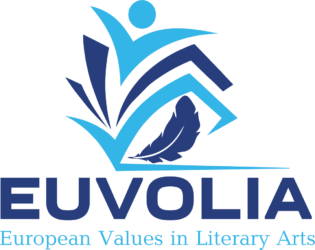
Zaporizhzhya National University is well known for its role as a Eurointegration hub of the South-Eastern Ukraine. May 28, 2021 it opened its doors (both physicallyand virtually, due to COVID-19 restriction) to the participants of the First International Conference “European Values in Ukrainian Education: Challenges and Perspectives” held under Erasmus+ Jean Monnet Module “European Values in Literary Arts”» (599918-ЕРР-1-2018-1-UA-EPPJMO-MODULE EUVOLIA).
The first day of the conference gathered 265 scientists, researchers, teachers, students, public intellectuals and managers of education from all over Ukraine, as well as from other countries: Sweden, the Netherlands, Great Britain and Germany. The ceremonial opening was held by ZNU First Vice Rector Oleksandr Bondar and Vice-Rector in Academic and Scientific Affairs Yurii Kaganov. The conference participants were greeted by the Deputy Head of Zaporizhzhya Regional State Administration Ruslan Shikhanov. ZNU’s trusted partner on many international projects, the National Erasmus+ Office of Ukraine, was represented by Zhanna Talanova and Petro Krainik.

The very meaning of acronym EUVOLIA, as the project’s co-coordinator Olena Tupakhina has stated in an opening speech, highlights the project’s priorities. Initially, euvolia is a medical term meaning normal water balance of a living organism. Jean Monnet Module EUVOLIA, in its turn, aims at restoring balance between job-specific and cultural competences of future secondary school teachers by introducing them to a complex phenomenon of European values through the lens of European literary arts.
Within the tree years of project’s implementations, 164 students of Zaporizhzhia National University from the faculties of Foreign and Slavonic Philology, Mathematics and Physics, History, Law, Biology, Social Pedagogy and Psychology, Sociology and Sports have attended EUVOLIA class to grasp the idea of European values and to get a better knowledge not only of European culture but also of their own mission as kulturtraegers and European values promoters. Throughout the study process, they gradually acquired critical media literacy skills and basics of deconstruction. As a result of their studies, they submitted over 40 student research projects, 34 of which have been published at EUVOLIA website, and 3 – in EUVOLIA conference proceedings.
Another important outcome from the project were social surveys conducted by EUVOLIA team to find out Ukrainian students’ set of values, as well as their attitudes to European values. The surveys results have been published in peer reviewed journals and collective volume.
EUVOLIA team did its best to reach beyond the university walls, to secondary school teachers, NGOs, independent researchers and experts and general public. Within the project’s life cycle, 2 round table debates were held, gathering over 100 participants in total. EUVOLIA outputs and outcomes have been presented at 6 international conferences, including 2 international LEAP workshops in Lviv and in Tbilisi. The project team established productive synergy with a lot of other Jean Monnet activities all over Ukraine. What is also important, EUVOLIA gave start to introducing European studies in ZNU curriculum: it has become a cornerstone for such projects as JMM EU-INDY and TEMPUS currently implemented at ZNU.

Olena Tupakhina specifically highlighted that, with Ukraine’s European future at stake, educational institutions step forth as powerful agents of change in terms of European Values promotion. By focusing on European Values’ role as an all-encompassing groundbreaking framework for national education reform, EUVOLIA treats this concept first and foremost as values in action – be it teaching, studying, policy making, quality assurance procedures, academic process management, student government or intellectual product design. This is why EUVOLIA conference welcomed topical case studies, best practices analysis and success stories just as much as cross-sectoral and multidisciplinary theoretical contributions.
The keynote session of the conference demonstrated its multidisciplinary nature to a full extend. It was opened by one of the most prominent figures in Ukrainian education, the Secretary of National Agency for Higher Education Quality Assurance, Dr. Myсhailo Wynnytskyj. In his speech, Dr. Wynnytskyj covered the value-related aspects of the groundbreaking PhD studies reform currently taking place in Ukraine and aimed at introducing the standards of openness, transparency and academic integrity.
This topic was further developed by Dr. Ian Gadd from Bath Spa University (UK), who used Erasmus+ KA2 CBHE DESTIN project as a case to discuss improving journalism and media training in Ukraine through values-based approach.
The Head of Ukrainian Association of Professors and Researchers of European Integration, Dr. Iryna Sikorska, talked about European identity concept and the role Erasmus+ program plays in establishing European values in Ukraine.
Dr. Marya Nesterova, the coordinator of EUVOLIA partner projects, SCEGES and EVDISD, currently implemented at National Pedagogical Mykhailo Dragomanov University, focused upon building up an inclusive educational environment based on European values concept.
The keynote session ended with Olena Tupakhina’s presentation summarizing the results of student research projects done within EUVOLIA course. In her analysis, Dr. Tupakhina proved that, in many cases, Ukrainian mass culture products clearly lack European agenda and European value-focused messages. A lot of products are still full of xenophobia, misogynies and survivalism. However, there is a growing sensitivity to such issues in Ukrainian student environment, which can lead to gradual transformation of the national media market.
